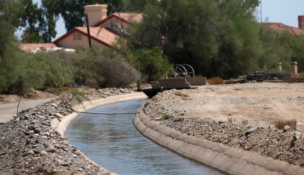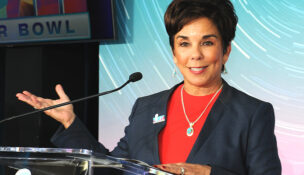Brewer again seeks Clean Elections panel applicant
Arizona Capitol Reports Staff//October 12, 2007//[read_meter]
Brewer again seeks Clean Elections panel applicant
Arizona Capitol Reports Staff//October 12, 2007//[read_meter]
Following the departure of Carl Kunasek from the Citizens Clean Elections Commission, Secretary of State Jan Brewer is seeking applicants to fill the vacant position.
Kunasek’s exit marks the end of a long tenure of public service, which began in 1972 when he was elected to the Arizona House of Representatives. Later he served as Senate president for two years, a stint followed by service with the Navajo and Hopi Relocation Commission and the Arizona Corporation Commission.
The Maricopa County Republican leaving also marks the difficulties Brewer has had finding and appointing commissioners to the agency that monitors and distributes public funds for statewide and legislative campaigns.
That job, she has said in the past, is complicated by statutes requiring periods of previous and future political inactivity of applicants, and others demanding the five-member commission be made up of no more than two members from the same political party or county.
The rules, she has said, effectively disqualify the group of people most needed: the politically interested.
“People aren’t banging down the door to serve on the Clean Elections Commission,” she told Arizona Capitol Times in March, adding that appointing commissioners would be easier if precinct committeemen, for example, could serve.
State law dictates that commissioners must not have sought, been appointed to or elected to public office, or served as an officer for a political party within the five years prior to being appointed.
Commissioners are also forbidden from serving as political officers, elected officials or lobbyists for three years after their five-year terms expire. No more than two members of the commission may be from the same party or county.
In December 2005, Brewer had to appoint a replacement for Kathleen Detrick, a Pima County independent whose five-year term expired. Detrick, according to commission documents, helped create and oversee a similar publicly funded campaign system in Tucson before her 2001 appointment by then-Attorney General Janet Napolitano.
While searching for a suitable replacement for Detrick, CCEC Commissioner Tracey Bardorf resigned due to a conflict of interest with the Department of Justice, where she worked as an attorney.
In mid-January 2006, Brewer appointed Clark Dierks to fill the vacancy left by Detrick, but the Coconino County Republican served two months and resigned due to a diagnosis of cancer.
A month later, Kunasek was selected by Brewer to finish the term of Bardorf, whose tenure was set to expire in January 2009. And in March, Royann Parker was appointed by Brewer to succeed Dierks.
Questions surfaced about Parker’s eligibility for the position, prompting a comment from Deputy Secretary of State Kevin Tyne, who stated Parker’s former membership with the Commission for Appellate Court Appointments did not disqualify her because it was not a “public office” precluded by the Clean Elections Act.
Extensions for the statute-required 30-day commissioner selection deadline were required for all of Brewer’s appointments. Kunasek, who recently left Arizona to harvest corn in Iowa, said he accepted the elections position on a temporary basis only as a favor to Brewer and that the role was “not my bag.”
And by his own account, Kunasek wasn’t enthused about the job — or the premise of publicly funded political campaigns, which he regards as an affront to citizens’ rights to not be forced to financially support candidates and issues.
“I do not agree with taxpayer-funded campaigns,” he said. “I’ve always had that position. Why should a taxpayer have to pay for a candidate that is 180 degrees away from their positions?”
Applicant support for publicly funded campaigns is preferable, but in the case of Kunasek, not entirely necessary, said Eric Ehst, the executive director of the Clean Elections Institute, a non-profit advocacy group.
Kunasek, he said, worked with an open mind and made no “overt” moves to subvert or undermine the law.
“That’s all you can ask of somebody,” Ehst said. “What we want is a commission that will try to implement the law in a fair and even-handed manner.”
And the requirement statutes for commissioners designed to minimize political motives among commissioners have worked fairly well, even though the appointment process was changed in 2000 by the Arizona Supreme Court’s decision in Citizens Clean Elections Commission v. Myers.
The ruling delegated the alternating appointment authority to the governor and the highest elected official of the opposition party. Originally, applicant screening was to be performed by the Commission of Appellate Court Appointments.
“They (creators of Arizona’s system of publicly funded campaigns) wanted to make sure the commissioners weren’t deeply imbedded or at least currently imbedded in a lot of partisan politics,” said Ehst, adding commissioners’ votes do not break down party lines. “It was part of keeping the commission nonpartisan.”
But the requirement for political inactivity for applicants does create some difficulty for newly appointed commissioners, said Ehst.
“There is a learning curve for commissioners,” he said. “They’re either people not involved with elective politics to start with or they’ve been out of it for some time.”
The CCEC’s most recent appointment, Jeffrey Fairman, was selected in late January by Gov. Janet Napolitano. The Pinal County Democrat is a former Avondale lobbyist and has served as a board member for the Arizona Association for Economic Development, the Peoria Sports Complex and the Greater Phoenix Economic Council.
Fairman serves on the campaign regulatory body with Chairman Gary Scaramazzo, an independent from Coconino County; Marcia Busching, a Democrat from Maricopa County; and Royann Parker, a Republican from Pima County.
Fairman replaced Yuma Democrat Ermila Jolley, a Jane Hull appointee. Fairman, whose term runs until 2012, lives in Casa Grande.
Tyne said the Secretary of State’s Office has received several phone calls from people inquiring about the position, but no applications have been received.
Due to the current political and geographical representation among the commission, Brewer must select a non-Democrat from any of Arizona’s 15 counties.
















